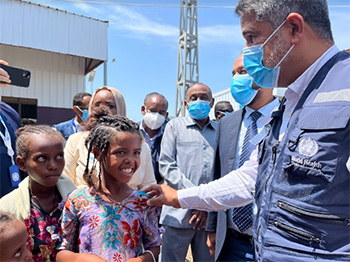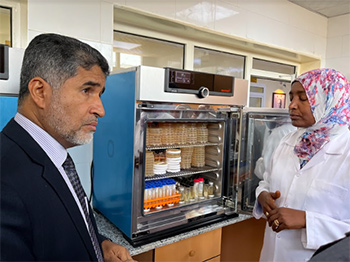 18 September 2022, Khartoum, Sudan — I have just concluded a visit to Sudan, where I spent 3 days travelling through 3 states — Khartoum, Gadarif, and Gezira — meeting with community leaders, health officials at the federal and state levels, health care workers, health partners and other stakeholders working together to improve the health and well-being of all people in Sudan.
18 September 2022, Khartoum, Sudan — I have just concluded a visit to Sudan, where I spent 3 days travelling through 3 states — Khartoum, Gadarif, and Gezira — meeting with community leaders, health officials at the federal and state levels, health care workers, health partners and other stakeholders working together to improve the health and well-being of all people in Sudan.
The challenges facing Sudan are massive and complex. I saw firsthand the struggles facing communities, health workers and officials, as well as WHO staff and health partners WHO is working within a context of limited resources and a challenging economic and political situation.
In a refugee camp in Gadarif state, I met Ethiopian families who, despite living in safety and away from conflict, are exposed to harsh elements and disease outbreaks such as malaria.
I met with communities living in flood-affected areas in Gezira state and saw reservoirs of stagnant water that create a breeding ground for water- and vector-borne diseases.
The links between climate change, severe weather events and health are increasingly evident, including drought and floods — both of which Sudan has experienced recently. WHO continues to raise the alarm on the link between drought, food security, hunger and disease: beyond malnutrition and the medical complications that can arise, lowered immunity makes people more susceptible to contracting water- and vector-borne diseases, especially when access to safe water is limited.
Health authorities, WHO, UNICEF and other health partners, and the dedicated health workforce, are determined to contain this multi-dimensional health crisis that seems to be getting worse each year, compounded by new threats such as civil unrest and inter-communal conflict, COVID-19, monkeypox, and increasingly extreme weather events.
In Gezira, where more than 24 000 families have been affected by floods this year — the highest number on record since 2013 — the Governor told me that he is reactivating the Heath Council to ensure a multisectoral approach to the emergency response and strengthen oversight and coordination.
 While a skilled health workforce is the backbone of any health system, shortages of health workers fleeing Sudan for better opportunities abroad have led to a massive brain-drain, leaving the country’s health system requiring additional specialized medical expertise.
While a skilled health workforce is the backbone of any health system, shortages of health workers fleeing Sudan for better opportunities abroad have led to a massive brain-drain, leaving the country’s health system requiring additional specialized medical expertise.
A dedicated team of WHO staff — despite being personally affected by these threats — is working with all key stakeholders to ensure support for disease surveillance and that the most vulnerable, including children, pregnant women, and those needing psychological support, are given the health services they need.
During my visit, we marked the end of the circulating vaccine-derived poliovirus 2 outbreak in Sudan demonstrating the skill and diligence of health workers and public health officials in the country, and the extraordinary commitment of the Government of Sudan in preventing children from being paralysed by this disease.
We also marked increased efforts to contain malaria through an intensified country-led response with support from WHO and the Roll Back Malaria Partnership.
The people of Sudan, resilient as ever, are determined to make advances in health. For the first time ever in the country’s history, Sudanese doctors have started to perform liver transplant surgeries inside the country. Last year, hundreds of children were provided with life-saving heart surgery. And the Mycetoma Research Centre in Khartoum University — a WHO collaborating centre — works with dozens of medical centres around the world to contribute to global research and development about this flesh-eating disease.
But within such a challenging context, only so much can be done. Unless the core roots of this health crisis are addressed, we risk losing the full potential of Sudan in continuing to make significant health advances.
Time and time again, peace and health have proven to be synergistic goals, with health a prerequisite for reaching peace, and peace a crucial condition for health.
Until the political and economic situation in Sudan stabilizes, and the impacts of climate change are addressed at a global level, these challenges will continue to impede our collective work to protect the health and well-being of millions of men, women and children who have been left to survive in the harshest of conditions with limited support from the international community beyond the immediate humanitarian response.
For audio-visual material from Sudan, please click here


